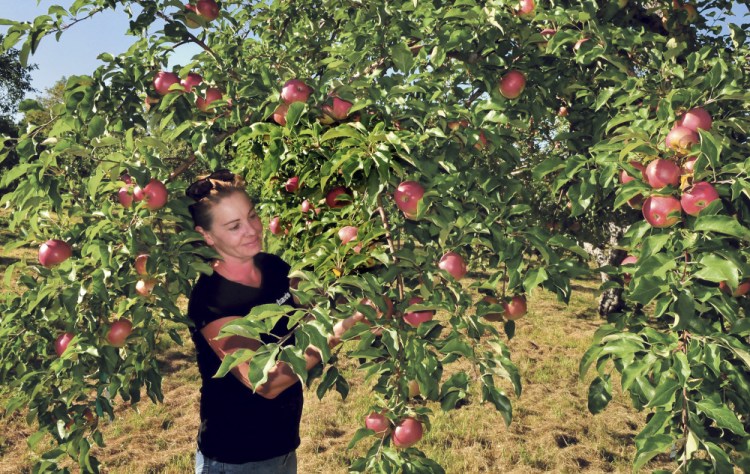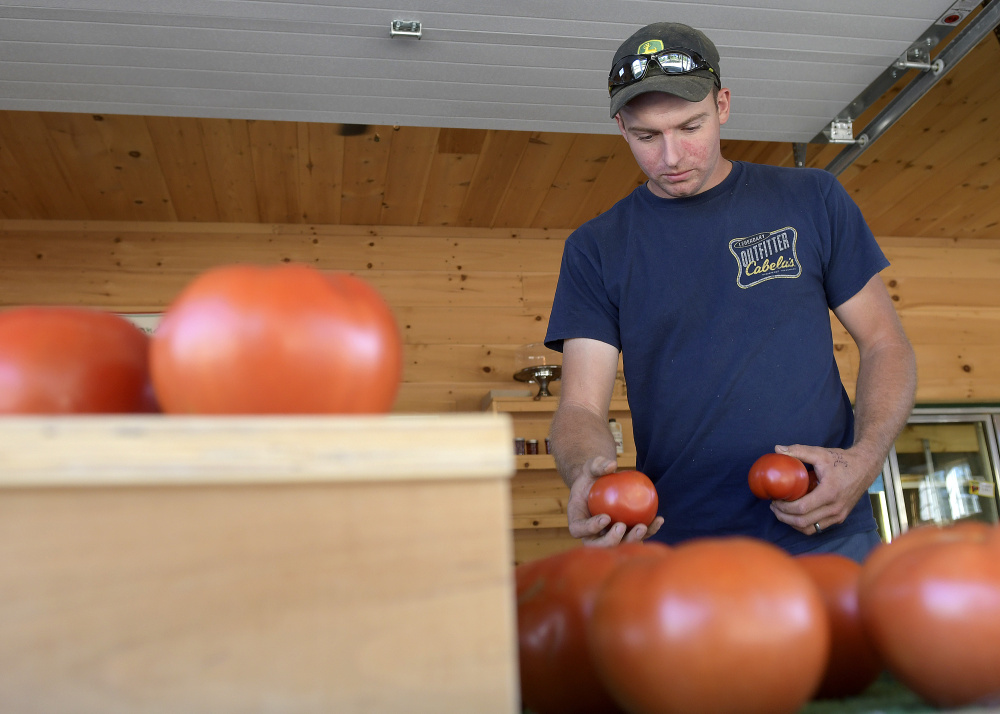RICHMOND — Richard Lee doesn’t spend much time hoping for rain.
As one of the owners of Tender Soles Farm in Richmond, he’s got too many other things to do, including trying to figure out how to lessen the impact of the late summer dry weather on his crops.
“Maybe we will not grow as much or shift crops around because we can’t irrigate all our fields,” he said.
Even as historic amounts of rain are falling across Texas and Louisiana, lawns are starting to turn brown across central Maine as the dry conditions that took hold in coastal towns earlier this summer start to press north and west.
“We haven’t had any reports of people with well issues,” Sean Goodwin, director of the Kennebec County Emergency Management Agency, said Monday. “There are good levels of ground water, and some of the surface water is drying out.”
And in a shift from the state’s usual pattern, conditions are drying out this year from east to west, he said. Normally, it happens west to east.
Heather Davis has seen that for herself.
“We just mowed the orchard and the grass is beautiful,” she said.
The Davises are the sixth generation to grow apples at Cayford Orchards in Skowhegan, and this has been a good year for it.
“My husband and I were just down in Searsport,” Davis said. “We couldn’t even believe how dry it was. They must not have gotten a lot of rain.”
In Skowhegan, enough rain has pushed through the area to keep the apple trees happy.
“Our crop looks amazing,” she said.
Davis and Lee are not the only people keeping an eye on the weather.
Farming forms a steady but growing part of the central Maine economy. According to the Census of Agriculture, the number of farms in Kennebec County has increased from 575 in 2002 to 604 in 2012, and the market value of production has increased from $30.3 million to nearly $50 million. In Somerset County over the same period, the number of farms has grown from 504 to 579, and the market value of production has more than tripled from $24.3 million to $86.4 million.
Steven Christianson has farmed all his life in Readfield and has had his own business for the last four years and he can attest to the vagaries of the rainfall. A week ago Saturday, about a quarter-inch of rain fell at his farm, but just north of Christianson Farm by a few miles, higher rainfall totals have been reported.
“It’s dry here, but not compared to what it was last year. The hay yields were down and the corn crop was down,” he said, by as much as 20 percent to 30 percent.
“This year, we had a wet spring for planting, so it pushed everything back,” Christianson said.
Tony Bachelder keeps track of the weather because he has bee hives deployed across the region, in places like New Sharon and Farmington, Gray and New Gloucester and Gardiner and Winthrop.
With crops ripening and fruits forming, the bees have fewer flowers to pollinate and collect nectar from. At this time of year, Bachelder said, they rely on wildflowers for nectar. The warm days and cool nights are idea conditions for goldenrod to produce nectar.
“Usually, we don’t get much out of goldenrod,” he said.
A year ago, homeowners in the region reported seeing hundreds of bees hovering over their swimming pools searching for moisture.
Bachelder said this year, the conditions are much improved.
“If there is something in bloom and it’s raining, the bees can’t work it,” he said. “We did get a little too much rain when the raspberries were in bloom.” Even so, this year offered better conditions.
In Richmond, at the northern end of Sagadahoc County, Lee said the dry conditions require more labor to monitor the crops and that means less time to manage disease and pests.
“From other farmer friends we have talked to, everyone is behind on weeds, because you are spending so much time on micromanaging instead of letting nature do the work of watering,” he said.
Even as Lee and his partner are considering whether they can put in a pond to augment the well water they use to irrigate and they watch how weather patterns have been developing across the region over the past few years, he remains philosophic.
“I am one to try to keep things in perspective,” he said. “History is valuable in that way so you don’t get dragged down in your current state of affairs. We’re lucky we’re still here. If you make a little less money, there’s always next year, and we’ll be better at it next year.”
Jessica Lowell — 621-5632
Twitter: @JLowellKJ
Copy the Story LinkSend questions/comments to the editors.




Success. Please wait for the page to reload. If the page does not reload within 5 seconds, please refresh the page.
Enter your email and password to access comments.
Hi, to comment on stories you must . This profile is in addition to your subscription and website login.
Already have a commenting profile? .
Invalid username/password.
Please check your email to confirm and complete your registration.
Only subscribers are eligible to post comments. Please subscribe or login first for digital access. Here’s why.
Use the form below to reset your password. When you've submitted your account email, we will send an email with a reset code.